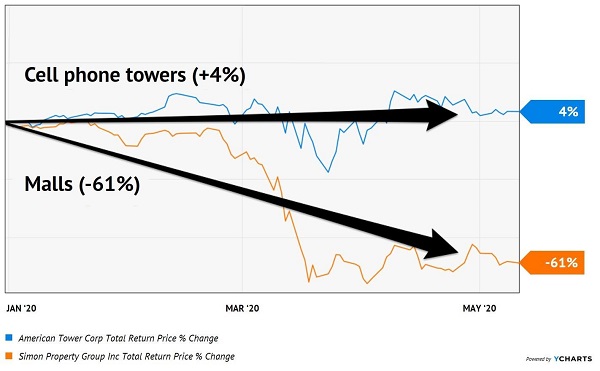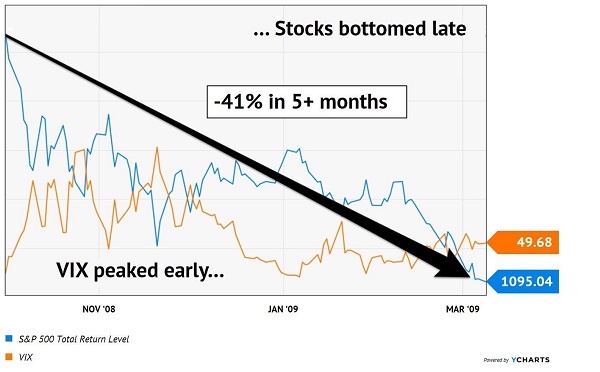Why the U.S. dollar still reigns supreme
“Brett, I didn’t sell (insert dividend stock here) in March. Should I hold my nose and sell now?”
If you sat on your hands during the March drop and subsequent bounce, you’re not alone. Many of your fellow income investors are still holding on to positions that they know they should probably sell, but haven’t yet. (I know this because I’ve heard this question from a number of you!)
Well, here’s the question I would ask you about the position:
“Is the business going to rebound to pre-pandemic levels any time soon?”
If the answer is “no” then why would you not sell the stock? This is the time to realign your portfolio with positions that will profit in this suddenly “distanced and remote” world that we inhabit. Plus, we have a nice little rally to sell into.
But wait, didn’t we just receive good news about a potential vaccine on Monday? We did, and it’s great to hear. However, the writing is on the wall for some business models. They are stuck in 2019, and the world has moved on.
We’re roughly two months into our “global quarantine.” Productivity experts say that it only takes about three weeks to develop and solidify a habit. (In my experience, this is about right.) Which means any quarantine quirks we’ve developed are probably here to stay.
That’s not necessarily a bad thing. For example, many of us have learned that it is possible to maintain a good level of physical fitness without visiting a brick-and-mortar gym. Whether you’re walking more, taking Zoom classes or simply dusting off that Peloton (NASDAQ:PTON) bike, these are good personal habits.
They are, however, probably tough business news for regular ol’ gyms. Peloton’s gain will likely be big box gym’s membership strain.
The Pandemic Reshuffled the Deck
This is the type of critical questioning we must apply to every stock we consider. It’s why I believe it’s too early to consider re-purchasing a commercial lender such as Ladder Capital (NYSE:LADR). The firm’s cash flow (and, hence, dividend safety) is more or less completely outside of its control right now. As businesses go out of business, they are going to miss their rent payments. There’s not much management can do about that.
There are many firms that became immediately irrelevant between February and now. It wasn’t necessarily their fault. However, the new deck has been dealt and we need to take responsibility for our dividend hands.
What about the Cohen & Steers Quality Income Realty Fund (NYSE:RQI)? It is dirt-cheap at the moment.
RQI is indeed incredibly cheap, trading at a 15% discount to its net asset value (NAV). Since its portfolio is a collection of blue-chip REITs, it means we can buy the portfolio for 85 cents on the dollar through RQI.
But real estate gets tricky when rentier (French for “landlords”) stock go bipolar. REITs took it on the chin when April 1, 2020 (and since, May 1) ticked over on the calendars and many rent payments were deferred. This is bad for REITs, which depend on these rents for their cash flows.
But not all rentiers are in dire straits. Retail landlords are, but we’ve been avoiding them for years, knowing that the e-commerce trend was not their friend. Consider, for example, a stock (and Hidden Yields favorite) like American Tower (NYSE:AMT) instead.
American Tower owns cell phone towers. As you can imagine, these are in hot demand with Americans sitting at home, staring at their phones and desperate for any online article, video or social media post to entertain them.
AMT has kept on humming while mall landlords such as Simon Property Group (NYSE:SPG) have fallen and not gotten up:
Same “Asset Class” But Wildly Different Returns (YTD)

RQI has a great track record, but the world economy is hitting a giant RESET button right now. And I just don’t trust anyone else to pick the winners and avoid the losers (there are too many losers!).
So… hospitals must be a winner, right? Which means we should look at Medical Properties Trust (NYSE:MPW) once again?
Well, it’s not that simple. Founder Edward Aldag notes that even usually-steady hospital cash flows are a bit uncertain at the moment. Hospitals are prioritizing COVID-19 patients and deferring non-critical procedures, which is the right thing to do from a human standpoint but creates potential gaps in cash flow.
I believe Ed and his excellent MPW team will eventually find a way to the other side. Shares yield 6.7% today, but my sense is that we’ll have an opportunity to get more dividend for our dollar in the months ahead as MPW muddles through the current environment that is challenging, even for hospitals.
In the meantime we’ll focus on the opportunities that are already back on the upswing.
But how can I earn a full yield on my money if you’re telling me to hold a chunk of cash?
Income is great—after all, that’s our beat!—but we don’t want to stretch too far for yield and risk our capital. The big dividends are going to be there, and we should be patient and add them to our portfolio when the time is right.
Believe it or not, this bear market is only three months old. A typical bear market lasts 12 to 18 months and much shorter than a bull market. A bear will trash a perfectly good portfolio quickly and thoroughly!
If the markets turn lower and shed a cool 41% (like they did from October 2008 to their final lows in March 2009), we’ll be thankful for our dry powder.
October 1, 2008 to March 9, 2009: -41% (Yikes)

It’s interesting to note that, back in ‘08, volatility actually peaked early while stocks meandered lower late. Will 2020 rhyme with “peak fear” happening in March while “reality bites” and many stocks actually slump lower in the months to follow?
Bear markets are tricky by nature. Monday’s manic rally naturally makes us want to dump all of our cash back into the market. However, if history is any guide, the aftermath of the initial crash is going to last for many months.
The stock market is likely to stay a rollercoaster. So, let’s fasten our seatbelts while we pay attention and compile our dream shopping list. The best dividend buys—those that only surface once a decade—are going to gradually become available in the months ahead as the market bobs and weaves.
Can’t Wait? “Drip” the Dip with 10% Yielding Monthly Payers
For those of you who prefer to “dollar-cost average” your way through these bear markets, consider monthly dividend stocks in times like these. Choose wisely, and you can enjoy a secure 10% annual income stream that features dividend payments every 30 days. Thanks to these payouts, you’ll be able to:
- Cover your monthly expenses without worrying about the stock market’s next move. Plus, you can…
- Reinvest any extra cash in the “deals of the decade” we’ve been discussing. A little bit of cash in these companies is going to quickly turn into a fortune in the next bull market. And thanks to these monthly payments you…
- Can simply “DRIP” the money into our shopping list stocks every month. You’ll naturally acquire more shares when prices are low. This dollar-cost averaging will help solidify your fortune for the rest of this decade.
Disclosure: Brett Owens and Michael Foster are contrarian income investors who look for undervalued stocks/funds across the U.S. markets. Click here to learn how to profit from their strategies in the latest report, "7 Great Dividend Growth Stocks for a Secure Retirement."
